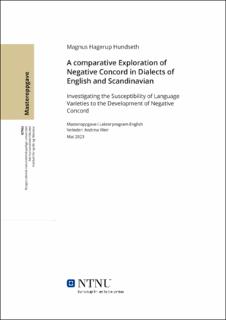| dc.contributor.advisor | Weir, Andrew | |
| dc.contributor.author | Hagerup Hundseth, Magnus. | |
| dc.date.accessioned | 2023-07-11T17:22:04Z | |
| dc.date.available | 2023-07-11T17:22:04Z | |
| dc.date.issued | 2023 | |
| dc.identifier | no.ntnu:inspera:145064670:34403775 | |
| dc.identifier.uri | https://hdl.handle.net/11250/3077859 | |
| dc.description.abstract | Denne tesen tar et nærmere blikk inn i hvordan negativt samsvar, fenomenet hvor flere negative elementer semantisk negerer en setning bare én gang, kan bli sett fra et komparativt perspektiv mellom ikke-standard engelske og skandinaviske varianter. Et historisk perspektiv mellom gammel-norrønt og gammel-engelsk er også inkludert, hvor vi kan se hvordan kontakt mellom språk kan påvirke hverandre. I likhet med dette vil det også være en utforskning av ikke-standard skandinavisk-språklige varianter som, til tross for at de befinner seg omringet av varianter som ikke innehar negativt samsvar, fortsatt innehar og vedlikeholder det språklige fenomenet. Hovedaspektet til tesen utfolder seg i et nærmere innblikk i hvordan noen språklige varianter forblir mottakelig til negativt samsvar, hvorav andre varianter ikke er i tilsvarende grad mottakelig. I tråd av dette, vil tesen presentere en seleksjon av påvirkende faktorer, mer spesifikt hvordan språklig kontakt og leksikalsk parameter resetting produserer en overordnet konspirasjon til språk og deres mottakelighet for negativt samsvar. | |
| dc.description.abstract | This thesis takes a closer look at how negative concord, the linguistic phenomenon where multiple negative elements semantically negate a sentence only once, can be viewed from a comparative perspective between non-standard English and Scandinavian varieties. A historical overview between Old Norse and Old English is also included, where we can see the influence a language can have on another language. Similarly, an exploration of non-standard Scandinavian varieties that, despite finding themselves in a hub of non-NC varieties, still manage to innovate and maintain the linguistic phenomenon. The focal point of the thesis is to undergo a closer examination of why some languages remain susceptible to negative concord while others do not. With this in mind, a selection of contributing factors, more specifically language contact and lexical parameter resetting, produce an overarching conspiracy to why languages are susceptible to NC. | |
| dc.language | eng | |
| dc.publisher | NTNU | |
| dc.title | A comparative Exploration of Negative Concord in Dialects of English and Scandinavian: Investigating the Susceptibility of Language Varieties to the Development of Negative Concord. | |
| dc.type | Master thesis | |
